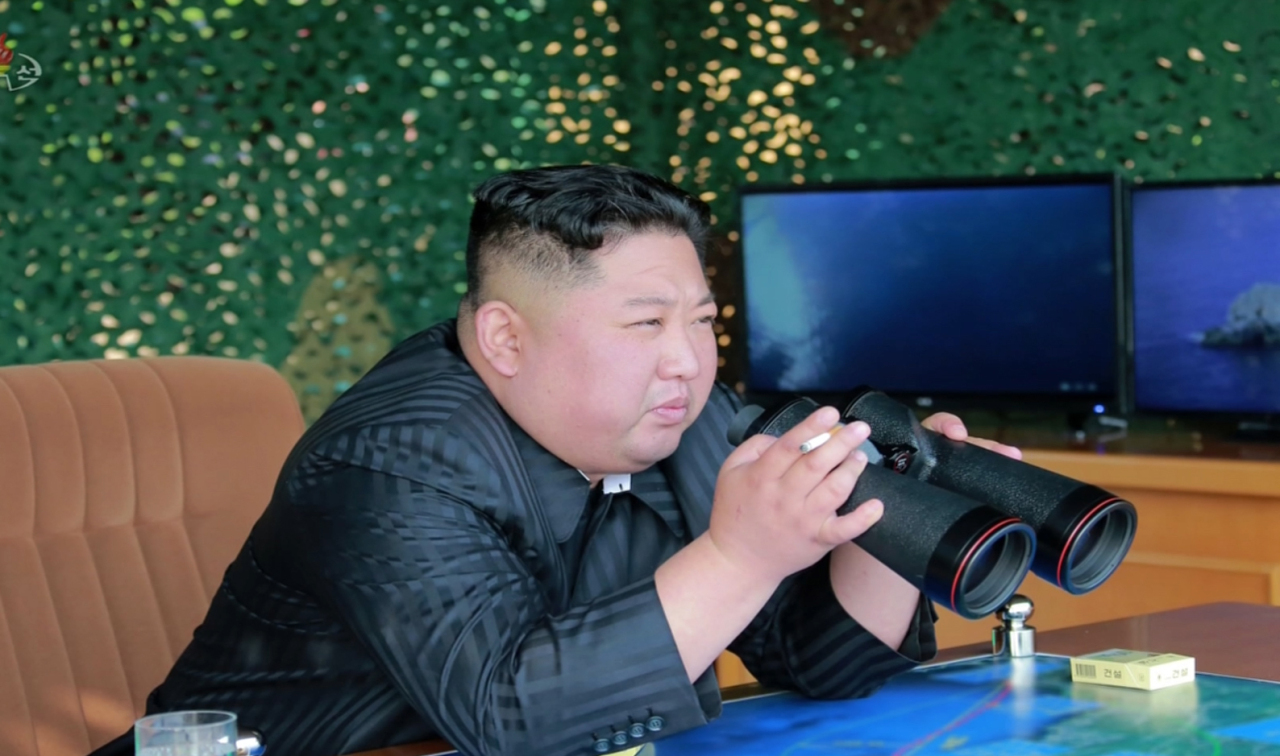North Korea's launch of yet more projectiles on Thursday signals that it wants more than the food aid Seoul and Washington are poised to discuss this week to lure it back to nuclear talks, analysts said.
Less than a week after launching a volley of short-range projectiles into the East Sea, the North fired off a couple of presumably short-range missiles, raising pressure on the United States to show flexibility in the hitherto unfruitful negotiations.
 |
(Yonhap) |
The North has been escalating tensions through low-intensity saber-rattling, but it has stopped short of breaching a self-imposed moratorium on nuclear and long-range missile tests in an indication that it still wants to keep dialogue alive, the experts noted.
"I think the North appears to be sending a message that it would not exercise restraint (in military terms) just for getting food assistance, and that the US and the South should not obscure the centrality of the issue by talking about the secondary issue -- humanitarian aid," said Koh Yu-hwan, a professor of North Korean Studies at Dongguk University.
"The North may think that it has passed the ball into the US' court, and will see how things will pan out following the projectile tests," he added.
The latest launch came at no better time to send that message to the US, as America's top nuclear envoy kicked off his high-profile four-day visit to Seoul on Wednesday for talks with senior South Korean officials.
On Friday, US Special Representative for North Korea Stephen Biegun is set to discuss with the South's top nuclear envoy, Lee Do-hoon, ways to resume dialogue with the North that are likely to include humanitarian assistance to the impoverished state.
Striving to salvage its much-vaunted peace drive, Seoul has pursued food aid to Pyongyang to help ease its food shortages and facilitate the resumption of nuclear negotiations between the US and the North.
The negotiations have hit an impasse since the second summit between US President Donald Trump and North Korean leader Kim Jong-un collapsed due to a failure to bridge gaps over the scope of Pyongyang's denuclearization and Washington's sanctions relief.
Humanitarian aid is one of the rare fields that Seoul can rely on to engage with Pyongyang, as it does not violate the international sanctions regime. Washington, strict on sanctions enforcement, has also shown support for food aid.
The talk of such aid as a catalyst for dialogue with the North came amid reports that Pyongyang is in dire need of humanitarian assistance after droughts, floods and other disasters.
According to the UN Food and Agriculture Organization and the World Food Program, the North produced 4.9 million tons of crops last year, the lowest amount in a decade, and needs 1.36 million tons of food aid from outside.
But through cryptic military tests, the North appears to be highlighting that it will continue to strengthen its tactical-level conventional arms for what it calls "self-defense."
"The North has clearly shown that what it wants is something bigger, that it would not waver under the prospect of food aid, and that it wants a dramatic shift in (the US') hard-line stance in the negotiations," said Park Won-gon, a professor of international politics at Handong Global University.
It remains to be seen how Trump will respond to the North's military moves at a time when Washington is facing the double whammy of a trade confrontation with China and escalating military tension with Iran.
But analysts said what is clear is that Trump may not want to debunk his own argument made after his first summit with Kim in Singapore last June that "everybody can now feel much safer than the day I took office."
Having put considerable political capital in his peace drive, South Korean President Moon Jae-in is expected to revive dialogue once again through what his government has called its "role as a facilitator."
Hammering away at its "self-reliance" mantra and with sanctions-driven economic travails ever deepening, the North Korean leader may also feel increasingly leery of consequences that would come should ongoing diplomacy be derailed, observers said.
(Yonhap)





![[KH Explains] For Korean automakers, Chinese EVs may loom larger than Trump’s tariffs](http://res.heraldm.com/phpwas/restmb_idxmake.php?idx=644&simg=/content/image/2024/11/14/20241114050537_0.jpg)
![[Graphic News] Tainan predicted top destination for South Koreans in 2025](http://res.heraldm.com/phpwas/restmb_idxmake.php?idx=644&simg=/content/image/2024/11/13/20241113050807_0.gif)

![[Herald Review] Cho Seung-woo takes 'Hamlet' crown](http://res.heraldm.com/phpwas/restmb_idxmake.php?idx=644&simg=/content/image/2024/11/14/20241114050593_0.jpg)